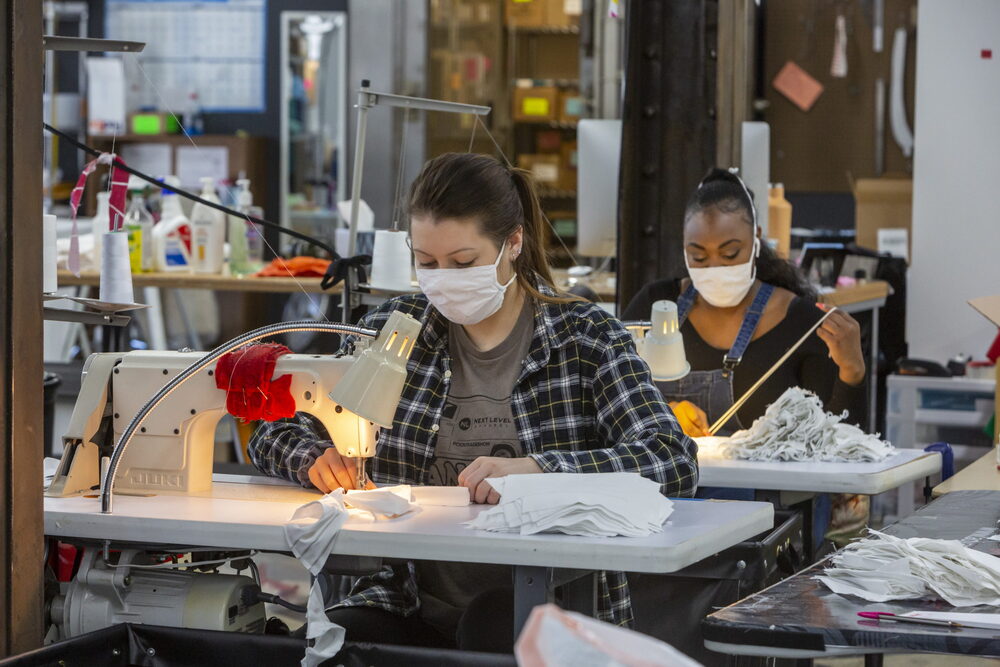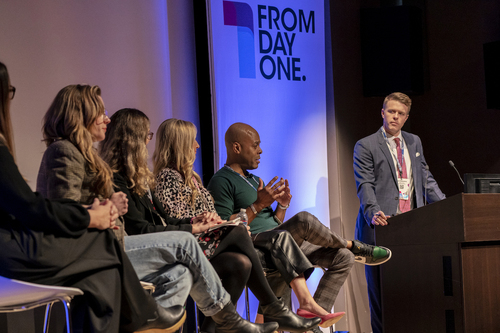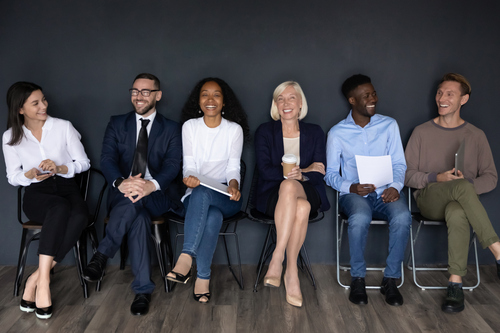Our news roundup focusing on how businesses and other organizations are making purposeful efforts to provide help at a time of crisis.
Updated April 16
Amazon: Testing all employees for Covid-19
CEO Jeff Bezos announced that Amazon will be expanding efforts to test employees for the coronavirus. “Regular testing on a global scale, across all industries, would both help keep people safe and help get the economy back up and running. For this to work, we as a society would need vastly more testing capacity than is currently available,” Bezos wrote to shareholders. He stated Amazon would be testing all employees, regardless of whether they were showing any symptoms of the virus.
Starbucks: Some locations to re-open
After closing a majority of stores in the U.S. and Canada on March 21, the popular coffee chain may re-open certain locations for drive-thru and to-go orders, depending on local health guidelines. The company will take a “monitor and adapt” stance, noted CEO Kevin Johnson, and will also be extending paid leave for employees and paying an extra $3 per hour to those still on the job.
Toyota: Teaming up to manufacture ventilators
Like many manufacturing companies, Toyota has adapted to creating medical equipment, particularly sought-after ventilators. Nihon Kohden, a Tokyo-based manufacturer of medical electronic gear, is now working with Toyota to boost output of ventilators by fivefold, reported Bloomberg. Nissan and other car manufacturers may follow suit.
Office Space: This company has created an office-sounds generator
Miss the office? Chances are you didn’t realize just how much you craved the sound of a copy machine. Kids Creative Agency, a culture design company based in Switzerland, just launched imintheoffice.eu, a simulator to bring us back to all the familiar and oddly nostalgic sounds of our offices.
Updated April 10
Twitter & Co.: Tech billionaires donate money and resources
Jack Dorsey, CEO of Twitter, announced this week that he plans on donating approximately one third of his wealth, or $1 billion, to coronavirus relief programs. Other celebrities from Jeff Bezos to Oprah Winfrey are following the trend, contributing millions to food banks and philanthropic organizations. While this provides much-needed short-term relief, critics warn that it's no substitute for what the government can do to alleviate economic inequities. “It’s really important to ask why the crisis has hit us the way it has and the weaknesses it’s exposed,” author Anand Giridharadas told Recode.
Restaurants: Becoming makeshift grocery stores
With empty shelves in grocery stores and worker strikes sweeping across popular grocery-delivery businesses, local restaurants are converting their closed locations into grocery stores. In San Antonio, dozens of businesses are pooling their resources to sell essential items, meal kits, and, of course, precious toilet paper.
Movie Theaters: Finding unique ways to stay afloat
As movie theaters large and small have been shut down due to social-distancing orders, some local cinemas are finding ways to stream new indie films with a new stay-at-home option. Customers can buy a ticket online and will receive a one-time viewing link and an option to support a local theater with their purchase. “We really do think that we’re supporting small theaters and their staff,” says Erik Lokkesmoe, president of Aspiration Entertainment.
Hair Salon: Founder makes emergency pivots to save company
Amy Errett, the founder of Madison Reed, a hair-color brand, taking drastic measures to adapt to the pandemic. After shutting down multiple stores in San Francisco, Errett has seen an increase in online orders by adjusting supply chains and giving hairdressers customer-service positions to help people color their own hair at home. “We quickly quadrupled the size of the Color Crew from 30 to 115 people to support increased customer demand, and got everyone set up in new jobs within a week,” Errett said.
Detroit Sewn: Local contractor starts manufacturing masks
A contract-sewing shop in Detroit is now working full-time making masks for healthcare staff, essential workers, and the elderly. Inspired by the "Arsenal of Health," a movement designed to pivot manufacturing, the company began work making 50,000 cotton reusable masks per week for healthcare workers in desperate need of personal protective equipment (PPE). The company has since partnered with several other non-profit organizations to distribute and develop machinery to make N95 masks, which are more effective at stopping the virus than standard cloth masks. "What's important to know is these are not alternatives to N95 masks, nor are they alternatives for surgical masks, they are considered standard face masks," says Detroit Sewn CEO Karen Buscemi.
Updated April 7
Tesla: Using car parts to make ventilators
The electric-auto maker released a video this week breaking down a prototype of its Model 3-borne ventilator, made partly of Tesla car components. The company joins Ford and General Motors in rushing to build ventilators that hospitals need to help severely ill coronavirus patients breathe. "Model 3 parts used in the Tesla ventilators include a mixing chamber and vehicle controllers and several components of its Model 3 infotainment system, including the touchscreen and infotainment computer," Fast Company reported.
Car-insurance companies: Giving customers a break
As motorists around the U.S. shelter in place, Allstate and American Family Insurance are cutting drivers some slack. Allstate will be giving 15% of its monthly premiums back to customers and American Family will send $50 for each vehicle registered with a policy. With fewer cars on the road, fewer accident claims are being filed, so companies are returning some of the windfall to customers. Not all auto-insurance companies are on board yet.
Grocery delivery: More ethical options
In response to worker strikes over hazard pay and workplace safety during the pandemic, a new company is empowering small shopping-and-delivery companies to compete with the big platforms like Instacart. Dumpling, a new shopping platform, allows users to hire local delivery-business companies to shop for their groceries and essential items. Founder and co-CEO Joe Shapiro stated that personal shoppers using the platform are earning a take-home pay of $33 per job, “an order of magnitude higher than the average that you see on other online delivery apps,” Fast Company reported.
Uber: Helping out-of-work drivers find jobs
Impacted tremendously by the coronavirus, 3.9 million hourly drivers are now looking for alternative means to make ends meet. This week Uber launched Work Hub, a platform to connect drivers to new job opportunities such as warehouse, food production, and customer-service positions. Uber will also connect drivers to opens outside of the company and will not collect commissions from partner companies.
Updated April 1
Kohl’s: Launching curbside pickup tomorrow
In an email to customers this week, Kohl’s CEO Michelle Gass announced that the 1,200-store chain would begin a new "drive-up" feature that allows shoppers to order items online and have them placed in the back of their cars upon arrival. The stores will remain closed to the public. Participating locations are to be announced on the company's website kohls.com starting tomorrow.
Facebook: New feature to encourage neighborly behavior
The social-media giant announced a new “Community Help” feature that allows users to volunteer to help neighbors in their area. Within a 50-mile radius, volunteers can help deliver groceries, medicine, and run errands for sick or elderly neighbors. The feature is set to roll out this week in the U.S., U.K., and France.
Crocs: Donating shoes to frontline health-care workers
The company's CEO Andrew Rees is donating 10,000 shoes for nurses and doctors across the U.S. Workers can have the shoes, known for their comfort and easy clean-up, delivered to their homes by going to crocs.com/freeforhealthcare. "These workers have our deepest respect, and we are humbled to be able to answer their call and provide whatever we can to help during this unprecedented time," said Rees.
Dallas Mavericks: Owner supports arena workers
NBA team owner Mark Cuban has put into place a program to continue to pay hourly workers who are now out of a job. With the league unsure when games will resume, thousands of workers are now left empty handed. Cuban also plans to work with organizations to provide day care for frontline health workers.
Bloom Energy: Fixing up old ventilators
While many companies are starting from scratch, a California-based company called Bloom Energy has taken to refurbishing thousands of old and broken ventilators to send out to hospitals in need. “This is a really good reminder and representation of the power of American manufacturing, and Americans coming together to support the community,” said Susan Brennan, Bloom’s chief operating officer.
Updated March 30
Yum Brands: CEO forgoes salary to help restaurant managers
CEO David Gibbs, who oversees brands including KFC, Pizza Hut, and Taco Bell, announced today that he will give his 2020 salary to restaurant general managers in the form of one-time, $1,000 bonuses. His expected $900,000 will also be used to fund the Yum Brands Foundation Global Employee Relief Fund to help employees directly impacted by the pandemic.
Facebook: A pledge $100 million to news media
News publishers, particularly the print media, are taking a hit during this pandemic and Facebook is offering its help. From the promised $100 million total, $25 million will be given to local media, while the remaining $75 million will be spent in marketing for global news organizations. Both Facebook and Google, whose dominance in the market for online advertising has exacerbated the decline of American newsrooms, have earlier pledged hundreds of millions of dollars to assist local media.
Johnson & Johnson: Making progress on a coronavirus vaccine
With a $1 billion investment from the Biomedical Advanced Research and Development Authority, a federal agency, Johnson & Johnson announced it is getting closer to a vaccine for the COVID-19 virus. Human testing could begin as early as September, with use possibly by early 2021. The company is also partnering with other countries to speed up manufacturing capacity.
Amazon: Alexa voice assistant now offering triage
The company has added a new feature to the popular Alexa voice assistant to help users gauge their risk level for coronavirus. The AI-bot will respond with questions about symptoms and travel history, while offering expert health guidance from the CDC about how to get help if they are at risk. Alexa will also sing you a song for 20 seconds while you wash your hands, the minimum washing time advised by health experts.
Medical drones: taking flight in the U.S.?
Zipline, a medical drone delivery service launched in Rwanda, is now working to bring its devices to the U.S. In Ghana, the company has already used the drones to deliver emergency masks and gloves to regional hospitals. The startup is currently brainstorming ways to use the drones for prescription delivery as well.
Updated March 27
Walmart: Waiving rent for essential partner businesses
For the month of April, Walmart will offer rent relief to more than 10,000 businesses housed in their stores such as hair salons, veterinary clinics, banks, and eye doctors. The company has seen a boom in sales since the coronavirus pandemic and has also announced it will give $500 million in bonuses to hourly workers.
Apple: New CDC-approved screening app and website
The company announced a new website and iOS app that allows users to take a questionnaire to screen for possible symptoms. The app and website include information from the Centers for Disease Control and Prevention about the virus and what to do if the app indicates that a user may be positive for COVID-19.
Instacart: Hiring as demand escalates
As more Americans stay home and avoid grocery stores, Instacart has announced it will seek to hire 300,000 independent contractors over the next three months, nearly doubling its current workforce. "The last few weeks have been the busiest in Instacart's history and our teams are working around the clock to reliably and safely serve all members of our community," said Instacart founder and CEO Apoorva Mehta.
Dyson: Founder designs new ventilator in record time
In response to an order from UK Prime Minister Boris Johnson, who is suffering from coronavirus himself, the vacuum-cleaner company announced that it has designed a ventilator that will be ready to distribute to hospitals as soon as April. The devices will meet National Health Service requirements.
Columbia University: Putting 3D printers to good use
Madiha Choksi, research-and-learning-technologies librarian at Columbia University, put the school’s 3D printer to work this week by printing face shields for health workers. With help of volunteers, she has turned a local New York community center into an assembly line for the equipment.
Updated March 25
Snapchat: New games encourage staying at home
Zenly, the Snapchat app that allows you to share your location with friends, is now releasing a Stay at Home leaderboard to challenge users to help contain the coronavirus outbreak by staying at home. Zenly also offers a coronavirus lens, which allows users to see the number of confirmed cases updated on a map three times per day using data from the World Health Organization and Johns Hopkins University.
Restaurants: New food automation and 100% contactless production
Creator, a restaurant in San Francisco, is innovating with automated food production and a new pressurized “transfer chamber” that allows workers and delivery workers to eliminate the passage of germs during pick-up. “We can’t restart the economy until retail and restaurant workers are protected,” says Creator founder Alex Vardakostas. “They’re some of the most important people to keep virus-free.”
Neiman Marcus: Partnering to ship protective gear to health-care workers
Luxury retailer Neiman Marcus and Jo-ann Stores, the fabric-and-craft chain, are joining efforts to provide masks, gloves, and scrubs in several facilities across the U.S. The materials are not fully medical grade, but will follow health guidelines from the Providence Hospital System in Washington, reported the Dallas Morning News.
3M: Ramping up N95 respirator mask production
Creator of Post-it Notes, Scotch tape, and various office supplies, 3M has been refining its response to health emergencies for nearly two decades. The company doubled global production of N95 masks and is shipping them to the hardest-hit areas in the U.S. The company is also announcing a partnership with Ford Motor Co. to produce air-purifying respirators for severely ill patients.
Updated March 24
Nike: Top Athletes promote new coronavirus PSA
The company known for the message “Just do it” is campaigning a new one: “Play inside, play for the world.” Among the famous athletes to endorse the message are LeBron James, Michael Jordan, and Cristiano Ronaldo.
Ford: new ads and expedited ventilator and mask production
Instead of a scheduled March Madness-themed campaign, Ford released a new ad with the tagline “Built to Lend a Hand,” encouraging those struggling to make car-loan payments to contact them if they need help, Fast Company reports. The company is also teaming up with 3M, GE, and the UAW to produce 100,000 face masks and disposable respirators using a 3D printer.
Kraft-Heinz: donating $12 million to




